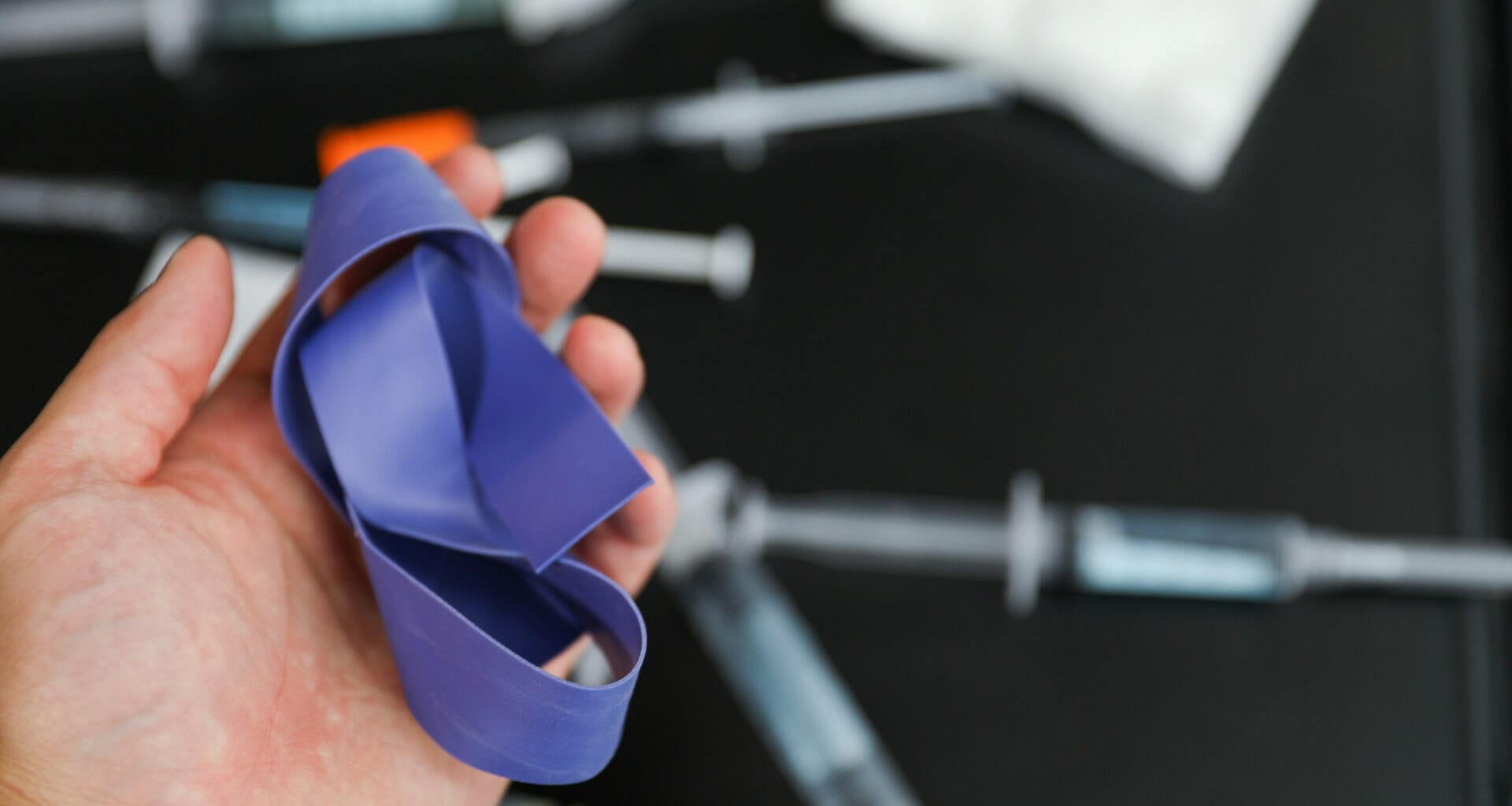A second Scottish NHS health board is considering offering heroin on prescription to drug users following an evaluation of a “successfully implemented” Glasgow-based pilot.
NHS Greater Glasgow and Clyde’s enhanced drug treatment service has offered about 30 of the city’s most “complex” drug users, living with “extreme levels of trauma”, up to two daily injections of diamorphine – known as medical grade heroin – along with access to other support services since it launched at the end of 2019.
The approach is used in many countries across the world including Switzerland, Germany, Denmark and Canada, for those for whom other replacement medications such as methadone has not been effective. Evidence shows that drug users gradually move from diamorphine injections to oral treatments.
Glasgow’s service was first developed by city authorities in response to concerns about rising HIV rates amongst injecting drug users as well as an increasing number of drug deaths.
In 2021 1,330 people died of a drug overdose across Scotland. Though suspected drug death figures for 2022 suggested the rate had fallen, particularly in Glasgow, the statistics for the first three months of this year suggest that decrease may not be sustained. From March to May, about 100 people were still dying each month.
Now NHS Tayside, which has previously seen a high level of drug deaths in the health board area, particularly in Dundee, has commissioned research into the “potential” for opening its own service offering heroin treatment to drug users.
A report will be considered by “relevant authorities” in the coming months, it said in response to queries from The Ferret.
Glasgow treatment evaluated
A recently published evaluation of the Glasgow-based pilot found that the majority of those prescribed medical grade heroin at an NHS-run clinic had reduced their use, reported better health and wellbeing, and had found more stable housing. They were less likely to end up at Accident and Emergency (A&E), and public injecting and begging amongst this group decreased.
However not everyone remained in the project, with six out of an initial 15 people who had been signed up leaving it, most within the first six months. All six were then referred to mainstream treatment services, but two people subsequently died.
Other limitations of the pilot were also highlighted. Though those who remained on the programme reduced their heroin use, their use of other drugs including cocaine and benzodiazepines “did not decrease to the same extent”, according to the evaluation.
Feedback from both participants and staff was that the service was “over-clinical” making it harder to offer therapy-focussed services.
Researchers stressed that specialists in mental and physical health, housing, relationships and life skills must be a key part of the service. Covid restrictions were particularly challenging for the early months of the service, it was claimed.
These were people who couldn’t engage with any other form of treatment previously.
Dr Andrew McAuley, Glasgow Caledonian University
Dr Andrew McAuley, of Glasgow Caledonian University, was the principal investigator on the Glasgow evaluation. He said those involved in the Glasgow pilot had “very complex needs” and high levels of polydrug use – taking different drugs at the same time – and had struggled to stay engaged with traditional treatment services.
“With that in mind, the fact that the majority of people who commenced treatment were still engaged after twelve months was a success in itself,” he added.
“These were people who couldn’t engage with any other form of treatment previously. We know that treatment is protective against mortality, but it helps people in a whole host of other ways – it’s really important.”
He acknowledged costs for the service were high. Earlier this year the NHS revealed almost £4million had been spent on the project, including start-up costs.
But added: “Some cost benefit analysis has been done and it shows reductions in overdose, ambulance call-outs and presentations to hospital emergency departments.”
The service also helped to protect against HIV, he added, the treatment for which is estimated to cost up to £360k in the course of someone’s lifetime.
“In a city like Glasgow, where there are high levels of problem drug use and people who are struggling to meaningfully engage with treatment, you have to be promoting choice.”
Other models, including offering the treatment in existing drug and alcohol services, could be considered to reduce costs, he said.
Right to recovery
Under Medication Assisted Treatment (MAT) standards, launched by the Scottish Government in April 2021, choice of treatment – including drug and alcohol rehabilitation centres – should be provided for those seeking help.
But in June an annual Scottish Government report revealed only 66 percent of alcohol and drug partnerships (ADP) had fully implemented the first five standards, which include access to same-day prescriptions and access to harm reduction supplies.
No alcohol and drug partnerships had fully implemented standards five to 10, which include access to mental health and psychological support for everyone seeking help with their drug use.
Some campaigners maintain that without legislation, services will not be held accountable when people are not given the treatment options they want. Previous freedom of information requests by The Ferret showed less than 3,000 people received public funding to go to rehab from 2011 to 2021.
In May last year, the Scottish Conservatives put forward a Right to Addiction Recovery bill – which was also backed by three Labour MSPs. It suggests “people addicted to drugs and/or alcohol” have the legal right “to access the necessary addiction treatment they require”.
A report setting out the potential for the service, including the specific needs within the city and the cost of delivering a service, will be presented to the relevant bodies in the autumn for consideration. We would anticipate that the research will include any learning from the Glasgow model.
NHS Tayside spokesperson
A spokesperson for NHS Tayside confirmed that Dundee Health and Social Care Partnership had “recently commissioned research into the potential for a diamorphine assisted treatment service within the city”.
“A report setting out the potential for the service, including the specific needs within the city and the cost of delivering a service, will be presented to the relevant bodies in the autumn for consideration,” they added. “We would anticipate that the research will include any learning from the Glasgow model.”
It is understood some other health boards have also expressed an interest in the treatment model though not taken it forward as yet.
Kirsten Horsburgh, chief executive of the Scottish Drug Forum, called for the service to be made available more widely across Scotland.
“The adoption of heroin-assisted treatment in Tayside would be very welcome but we need national coverage as indicated by the Medication Assisted Treatment standards regarding choice, which should be implemented as a matter of urgency,” she added.
“The case for prescribing medical grade diamorphine is grounded in a substantial evidence-base and a key part of the National Mission to reduce drug deaths. We face huge challenges and are experiencing a public health emergency. This demands actions which are long overdue.”
A spokesperson for NHS Greater Glasgow and Clyde said: “The pilot of the enhanced drug treatment service in Glasgow has demonstrated that diamorphine assisted treatment can be implemented safely and effectively in a population group which is marginalised or has complex needs.
“The service did experience some challenges, but the outcomes have largely been positive.
“We aim to further develop the programme and significantly increase capacity over the coming months, and we will continue to share learning and evaluations with Alcohol and Drug Partnerships across Scotland, so others can benefit from the experience gained in Glasgow.”
Cover image thanks to iStock/Isaac Lee














